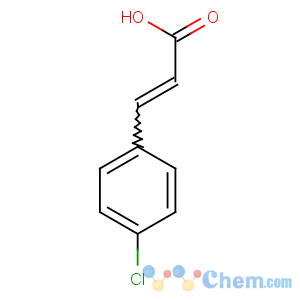4-chlorocinnamic acid
-
- Product Name4-chlorocinnamic acid
- CAS No.1615-02-7
- Purity99%
- Min Quantity
- Price~

 View Contact Detail
View Contact Detail
-
 Molecular Structure
Molecular Structure
Detailed Description
Name : 4-chlorocinnamic acidCAS number : 1615-02-7
Molecular formula: C9H7ClO2
Molecular weight: 182.60400
Exact mass: 182.01300
PSA: 37.30000
LOGP: 2.4378
Density:1.332g/cm3
Boiling point:325.3oC at 760mmHg
Melting point:248-250oC(lit.)
Flash point:150.5oC
Storage temp : Room temperature.
Package: Kraft paper bag
Nature: colorless crystal. There are cis and trans. Soluble in ethanol
Preparation methods: From p-chlorobenzaldehyde and acetic anhydride. The p-chlorobenzaldehyde, acetic anhydride and sodium acetate were reacted together at 180 ° C for 13h. After the reaction was completed, it was slightly cold, poured into water, filtered, the filter cake was washed with water, and repeatedly dissolved with ammonia water, until only a small amount of brownish yellow sticky substance remained. The obtained ammonium salt solution was filtered, and p-chlorocinnamic acid was re-precipitated with 3N dilute sulfuric acid, and the product was dried by filtration. The yield is about 80%.
Usage:
Intermediate for organic synthesis, used to synthesize p-chlorophenylpropionic acid, to produce herbicide Mai Di San.Used in the synthesis of pesticides and herbicides.The spot is used in foreign trade export, scientific research and reagent production, etc.Avoid contact with skin and eyes. Avoid formation of dust and aerosols. Avoid exposure - obtain special instructions before use.Provide appropriate exhaust ventilation at places where dust is formed.Containers can be triply rinsed (or equivalent) and offered for recycling or reconditioning. Alternatively, the packaging can be punctured to make it unusable for other purposes and then be disposed of in a sanitary landfill. Controlled incineration with flue gas scrubbing is possible for combustible packaging materials.